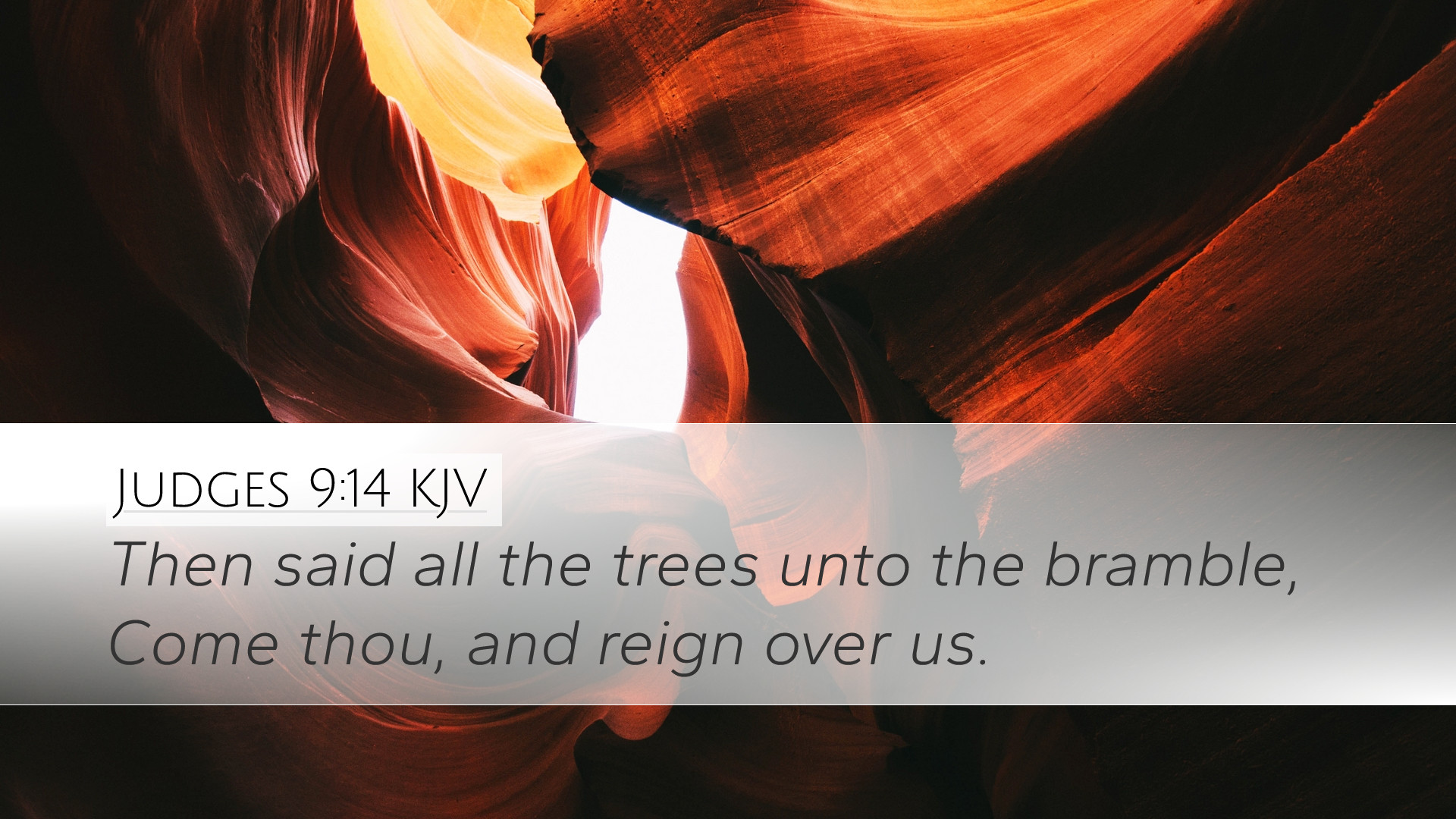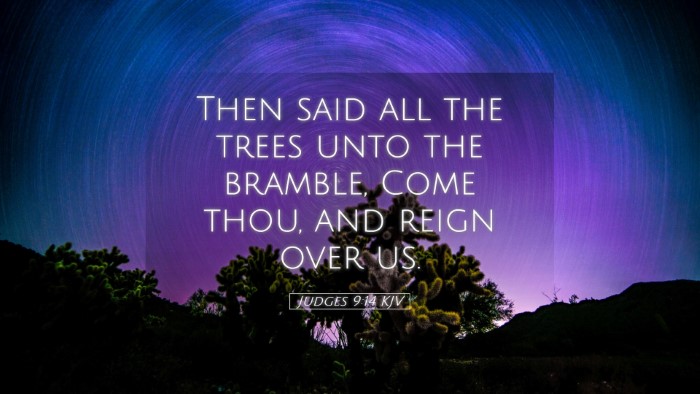Biblical Commentary on Judges 9:14
Judges 9:14 states: "Then said all the trees unto the bramble, Come thou, and reign over us." This verse unfolds within the context of Abimelech's rise to power and presents a poignant critique of the choices made by Israel’s leaders.
Contextual Analysis
The context of Judges 9 is crucial for a proper understanding of this verse. Following the death of Gideon, also known as Jerubbaal, his son Abimelech sought power by rallying support from the citizens of Shechem. This power grab is a significant shift from the leadership style seen in the judges and highlights the theme of the desire for monarchy in Israel.
Symbolic Interpretation
The trees' dialogue serves as a powerful metaphor that reflects the nature of leadership and the criteria by which leaders should be chosen. Here’s a breakdown of the symbolism:
- Trees: Often in Scripture, trees represent stability, growth, and divine provision. In this metaphor, they symbolize the legitimate leaders of Israel.
- Bramble: The bramble, or thornbush, symbolizes a lowly, undesirable choice that lacks true leadership qualities. The bramble’s offer of kingship reflects a desperate and misguided aspiration for governance.
Theological Implications
Judges 9:14 commands attention because it reveals deep theological truths about leadership and the nature of God's governance:
- The Choice of Leaders: The plea from the trees indicates the Israelites' desire for leadership, but the choice they make in selecting the bramble highlights a profound error. It illustrates humanity's tendency to choose hastily and without divine guidance.
- Divine Sovereignty: By allowing the bramble to be chosen, the passage underscores the consequences of forsaking God’s appointed leaders in favor of self-serving desires.
- The Perils of False Leadership: The bramble's subsequent reign foreshadows the trouble and bitterness that comes from choosing leaders based on superficial qualities rather than godly character and divine ordination.
Commentary Insights
Matthew Henry’s Perspective
Matthew Henry remarks on the folly of the choice made by the trees, emphasizing the nature of the bramble's reign as one that would ultimately yield no true satisfaction or benefit. He points out that the trees were looking for a leader who would provide shade and security, but instead, they chose a leader that epitomizes barrenness and danger.
Albert Barnes’ Commentary
Albert Barnes elaborates on the implications of this choice by highlighting the failure of the trees to discern the nature of the bramble. He notes that this reflects the broader spiritual decline of Israel, where divine leadership is rejected in favor of the easier, more convenient choices, leading to disastrous consequences.
Adam Clarke’s Observations
Adam Clarke focuses on the idea that the bramble represents not only a poor choice of leadership but also serves as an indictment of the nation's spiritual state. Clarke sees the bramble as a warning against the allure of strong but hazardous leaders who can promise power without the qualities necessary for righteousness and justice.
Practical Applications
This passage serves as a crucial reminder for contemporary leaders, scholars, and congregants alike. Here are some practical applications drawn from Judges 9:14:
- Discernment in Leadership: Believers are called to seek and cultivate leaders who embody godly principles, rather than those who merely promise immediate gratification or success.
- Understanding Consequences: The repercussions of poor leadership choices are profound, affecting the entire community. It urges individuals to consider how their decisions impact broader societal structures.
- Reflecting on Godly Criteria: The attributes of a true leader are revealed in Scripture. We are called to align our expectations and criteria with those found in God's Word, promoting leaders who reflect His character.
Conclusion
In summary, Judges 9:14 is more than a simple narrative of Israel's request for a king; it is a profound comment on the nature of leadership, discernment, and the consequences of choices made apart from God’s guidance. As we reflect on the lessons from this passage, we are reminded of our own responsibilities in seeking leaders who align with God’s will and embody His character. This commentary aims to resonate with pastors, students, and theologians alike—inviting all to engage deeply with the eternal truths found in Scripture.


